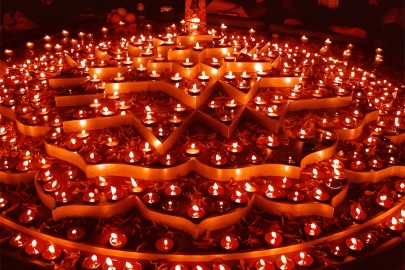www.triptotemples.com | India’s No. 1 Kailash Yatra Agency
Top Kailash Yatra Packages
Sawan Shivratri 2025: Complete Guide to Muhurat, Puja Vidhi, and Sacred Rituals to Worship Mahadev
Published : 22-Jul-2025 06:30:09 PM
Share This News :
As devotees across the nation prepare for one of the most significant Hindu festivals, Sawan Shivratri 2025 is set to be observed on Wednesday, July 23, 2025. Following the grandeur of Mahashivratri, this sacred occasion stands as the second most important day dedicated to Lord Shiva worship, carrying profound spiritual and religious importance.
Highlights
- Shravan Krishna Chaturdashi Tithi will commence on July 23, 2025, at 4:39 AM and conclude on July 24, 2025, at 2:28 AM.
- Auspicious Time of Jalabhishek of Mahadev begins during Brahma Muhurta, specifically from 4:15 AM to 4:56 AM on July 23.
- Rituals include Jalabhishek, with pure water, milk, ghee, yogurt, and honey, offering fresh bilva leaves, white flowers, fruits, chanting of powerful mantras, particularly the Maha Mrityunjaya Mantra.
What is the Sawan Shivratri Muhurat 2025? According to Hindu calendar calculations, the Shravan Krishna Chaturdashi Tithi will commence on July 23, 2025, at 4:39 AM and conclude on July 24, 2025, at 2:28 AM. This sacred observance involves prayers, fasting, and seeking divine blessings, with key rituals and night-long worship continuing into the early hours of July 24.
The most auspicious period for performing Jalabhishek of Mahadev begins during Brahma Muhurta, specifically from 4:15 AM to 4:56 AM on July 23. Devotees can continue offering Jalabhishek throughout the entire day, as this practice is believed to invoke divine blessings and spiritual purification.
The night of Sawan Shivratri is divided into four sacred Shivratri Prahars, each offering unique opportunities for devotional practices:
|
|
|
|
|
|
|
|
|
|
|
|
|
|
|
|
|
|
|
|
|
|
|
|
|
It is believed that while most Hindu deities are not worshipped during Rahukaal, Lord Shiva worship during Rahukaal is considered highly beneficial, particularly for those seeking relief from Kalsarpa Dosha.
The Sawan Shivratri puja vidhi encompasses several essential elements rooted in ancient Vedic traditions. The primary ritual involves the sacred Jalabhishek, where devotees bathe the Shivling with pure water, milk, ghee, yogurt, and honey in a specific sequence. Following the Jalabhishek, devotees offer fresh bilva leaves, white flowers, fruits, and other traditional offerings. The ritual also includes the chanting of powerful mantras, particularly the Maha Mrityunjaya Mantra, which is believed to provide spiritual energy and divine protection.
The festival's spiritual importance stems from the ancient legend of Samudra Manthan (churning of the ocean). According to Hindu mythology, when Lord Shiva consumed the deadly poison (Halahala) that emerged from Manthan, devotees began offering Jalabhishek to honor this supreme sacrifice and to help neutralize any residual negative energy.
Observing Sawan Shivratri vrat (fasting) is considered highly spiritual. Devotees typically consume only water and fresh fruits throughout the day, dedicating their minds entirely to Lord Shiva's worship. Many faithful followers engage in night-long jagran, staying awake throughout the four Prahars while singing devotional bhajans, reciting Shiv Puran stories, and performing continuous prayers. It is believed that sincere worship during this period can fulfill desires, remove obstacles, and provide liberation from worldly sufferings.
Share This News :
Popular Videos
#IAmShravanKumar
Reach out to us
Have An Enquiry? Write To Us…
Popular Pilgrimage Packages
Related Blogs
We Got Featured in the Media
What People Say About Us

Tour Resources
Trip To Temples Packages
Popular Destinations
© 2026 Trip To Temples. All Rights Reserved.
Design & Developed By : Divine Mantra Pvt Ltd

























